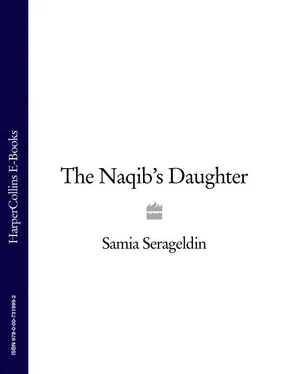SAMIA SERAGELDIN
For Kareem and Ramy
Prologue
PART I: The First Hundred Days
1 The Enemy at the Gates
2 The Battle of the Pyramids
3 The Savants of the Nasiriya
4 Aboukir
5 The Banquet
6 The First Insurrection
PART II: The Reversal of Fortune
7 The Plague
8 The Tivoli
9 The Second Insurrection
10 The Assassination
11 The Dangerous Liaison
12 The Beginning of the End
13 The Evacuation
PART III: The Aftermath
14 The Trial
15 Quarantine
16 The Emissary
17 The Letter
18 The Citadel
PART IV: The Journey in Reverse
19 A Rock in the Middle of the Sea
20 The Great Metropolis
21 The Spy
22 Windsor Castle
23 The Hand of Providence
24 The Eagle’s Feather
Epilogue
GLOSSARY
HISTORICAL NOTES
AUTHOR’S NOTE
Acknowledgments
Also by the Author
Copyright
About the Publisher
‘Soldiers! You are about to undertake a conquest of incalculable consequences for civilization and commerce! You will deal the English a blow to the heart.’
Napoleon Bonaparte exhorting the army before the invasion of Egypt
‘Egypt was once a province of the Roman Republic, it must become a province of the French Republic.’
Minister of Foreign Affairs Talleyrand to the Directoire,
14 February 1798
Quartidi, 4 Messidor, Year 6 (22 June 1798) On board L’Orient
Ah, but they were a brave sight upon the sea! Nicolas Conté’s lungs swelled like the sails ballooning in the wind above him. Their ships covered the horizon: thirteen warships, six frigates, a corvette, and over three hundred cargo ships. And what precious cargo! Such as never accompanied an armada in all of history – even a printing press with Arabic characters.
For it was to be Egypt, after all. After all this secrecy and all these months of rumours, after all this talk of India, it was to be Egypt, definitely. Bonaparte had just announced it officially, after weeks at sea. Even so, in spite of all the secrecy, Nelson might well have caught wind of their destination and might even now be chasing the French fleet around the Mediterranean. But Conté trusted in the destiny of their mission; they could not fail. In Egypt they would bring the light of Liberty to an ancient civilization buried in the sands of ignorance and Oriental despotism.
For this expedition was surely unique in the annals of history: Bonaparte’s Army of the Orient was accompanied by over one hundred and fifty savants, scientists and artists, including Nicolas Conté and his corps of military engineers. They were overwhelmingly young, the members of the Scientific Commission, and Conté sometimes felt quite the elder at the command of his balloonist brigade, many of whom regarded him with the unflattering awe normally reserved for a relic. Perhaps, he thought ruefully, it was his eye patch that impressed them so. But then again, he reminded himself, our General Bonaparte himself is not quite thirty!
Bonaparte, it was known, had read every treatise he could lay his hands on about Egypt’s religion, history, philosophy and science; he had even found the time to pen a novella called The Mask of the Prophet . Never, Conté marvelled, had an enterprise been undertaken in such a lofty spirit, or a campaign so carefully prepared, or a dream cherished for so long.
Now Bonaparte was exhorting his men from the deck of L’Orient : ‘The people among whom we will live are Muhammadans. Their first article of faith is that there is no God but God and Muhammad is his prophet. Do not contradict them … Show the same tolerance for the mosques and the rituals of the Koran as you did for the convents and synagogues, for the religions of Moses and Jesus Christ. You will find different customs, you must get used to them. Their way of treating women is different. But in any culture he who rapes is a monster.’
Conté had no doubt they would be welcomed by the Egyptians, to whom they would come as liberators rather than conquerors, bearing the incomparable gift of the Rights of Man. As for the vaunted Mamlukes who oppressed the people of the Nile, favouring English merchants at the expense of the French, the blood had run thin in that warlike race. All they knew was cavalry, and the age belonged to cannon and musket. Foreign-born, strangers in their own land, they lived as parasites on the natives. Nothing should be easier than to turn the people against them.
And what incomparable discoveries awaited the French Scientific Commission! The Sphinx itself would no longer have any secrets for them. Conté chafed with impatience to see the coast of that ancient land appear over the horizon. What a long way he had come from his humble little village of St-Céneri-le-Gérei, Nicolas-Jacques Conté, the self-taught son of peasants, promoted rapidly in the Republican ranks by the sheer merit of his genius, the Director of the first Engineering School in France; and here he was now at forty, launched on the adventure of his lifetime, of all their lifetimes – an expedition for the ages.
‘Land ho!’
Conte’s heart leapt in his chest. Egypt, at last! The great adventure had begun.
PART I
The First Hundred Days
ONE
For only the second time in her forty years of life, Lady Nafisa the White dreaded the dawn. Sleep had eluded her all night, but she lay quietly in order not to disturb her maids in the adjoining room. They would have risen, bleary and heavy-limbed with sleep, and hovered around her bed, offering to bring mint tea, or to massage her feet.
Nafisa knew where her husband was tonight, and wished it were with another woman.
She glanced at the gold-mounted ormolu clock with the rose faience face that she could not make out in the dark. It had been a present from the French consul, Magallon, in happier times. The irony struck her: how the world had changed! But she did not need a clock to tell the time; she could smell the dawn in the air before the first bird stirred, before the muezzin cleared his throat to chant the call for prayers; long before the watchmen unlocked the heavy wooden gates that secured each neighbourhood for the night against robbery and mischief. She knew the exact order in which the gates to the quarters were drawn back: first the Moroccan quarter, then the Jewellers Lane, then the Nasiriya quarter where most of the European merchants lived, then the Ezbekiah Lake and the Alley of the Syrians, and finally the gates to the Citadel. Cairo was her city; she could take its pulse at any moment.
The first time Nafisa had lain sleepless had been her wedding night – her first wedding night, thirty years ago now, to Ali Bey. Her awe of her husband-to-be had been complete. As a child she had seen his image struck on coins: Ali Bey the Great, sole master of Egypt. She had watched from the latticework shutters of the harem windows as he rode past at the head of his army, on one campaign or another, to Syria and the Sudan and the borders of Egypt. When his choice had fallen on her for his second wife, the honour had been overwhelming.
Her hair had been long and thick like a curtain then, the colour of light molasses where it sprung at the roots, grading down to the clearest honey where it slapped against the back of her knees. The first time she had undressed before Ali Bey, she had shaken her hair about her in a shudder of modesty, cloaking herself with her own tresses. He had thrown his head back and laughed, and her dread had begun to melt around the edges.
Читать дальше












